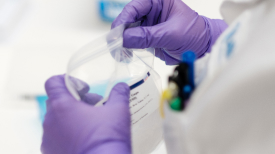- Cancer Care Team
Cancer Care Team
To deliver optimal patient outcomesProducts and Services
Cancer Type
Supplies & Tools
Scientific Focus
- Biopharma Partners
- Patients
- Education & Events
- Login
- Contact Us
Test Details
 Turnaround Time
Turnaround Time
5 days
Use
This test is used for leukemia/lymphoma monitoring of residual disease, transplants and indolent clones.
Special Instructions
Indicate pertinent clinical diagnosis and previous cytogenetic studies on the test request form if available.
Test Includes
This test includes FISH Probes, FGFR1, JAK2, PDGFRA and PDGFRB.
Limitations
Molecular mutations below the resolution of FISH will not be detected. This test will not detect regions not targeted by FISH probes in this panel.
This test was developed and its performance characteristics determined by Labcorp. It has not been cleared or approved by the Food and Drug Administration.
Methodology
Fluorescence in situ hybridization (FISH)
Specimen Requirements
Information on collection, storage, and volume
Specimen
Blood, bone marrow, CSF, fixed-cell pellet from a cytogenetic analysis, slides with metaphase and/or interphase nuclei or bone marrow touch prep slides are acceptable for testing
Blood, bone marrow, CSF, fixed-cell pellet from a cytogenetic analysis, slides with metaphase and/or interphase nuclei or bone |
Blood, bone marrow, CSF, fixed-cell pellet from a cytogenetic analysis, slides with metaphase and/or interphase nuclei or bone marrow touch prep slides are acceptable for testing marrow touch prep slides are acceptable for testing |
Volume
10 mL blood (adult), 5 mL blood (pediatric), 3 mL bone marrow
Minimum Volume
5 mL blood (adult), 1 mL blood (pediatric), 1 mL bone marrow
Container
Green-top (sodium heparin) tube (pediatric Vacutainer is optimal, lavender-top (EDTA) tube is suboptimal); adjust tube size to sample volume to avoid heparin toxicity
Causes for Rejection
Broken Vacutainer; broken or stained slides; paraffin blocks; paraffin slides; decalcified bone cores; frozen specimen; quantity not sufficient for analysis
Collection
Transporting to the testing lab at room temperature is acceptable. Do not allow the sample to overheat or freeze. Use a cool pack or Labcorp transport kit if necessary. Specimens should optimally arrive in the laboratory within 48 hours of collection. Indicate date of collection on the test request form.
Related Tests
Find more tests related to this one.



